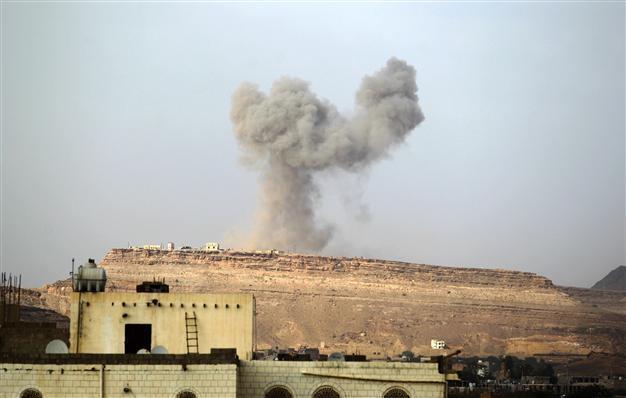Deadly car bomb hits Shiite mosque in Yemen capital
SANAA - Agence France-Presse

Smoke billows following an air-strike by the Saudi-led coalition on a weapons depot, currently controlled by Yemeni Shiite Huthi rebels, on July 6, 2015 in the capital Sanaa. AFP Photo
A car bomb exploded outside a mosque in the Yemeni capital of Sanaa on July 7, killing at least one person and wounding five, in a fresh attack on Shiite rebels claimed by the Islamic State of Iraq and the Levant (ISIL).Meanwhile, a Saudi-led coalition bombarded cities and towns in southern Yemen, as the targeted rebels accused it of killing 124 people on July 6 in one of the deadliest days of its air war.
July 7 bloodshed came two days after UN envoy Ismail Ould Cheikh Ahmed arrived in Sanaa bidding to secure a humanitarian truce in a conflict estimated to have killed 3,000 people, mostly civilians.
The car bomb, at the Al-Raoudh mosque in southeast Sanaa, went off as worshippers were leaving after evening prayers, witnesses and a security official said.
A medical source said at least one person was killed and five more wounded.
In a brief statement posted on jihadist websites, ISIL said it had "taken revenge" against the Huthi rebels who have seized swathes of the country.
Elsewhere on July 7 evening, four rebels were killed and 10 wounded in a suicide car bombing that targeted a police station in rebel-held Baida, in central Yemen, a security official and witnesses said.
Baida is a stronghold of Al-Qaeda in the Arabian Peninsula (AQAP), also very active in southern and southeastern Yemen.
The capital of Sunni-majority Yemen has been under the control of the Iran-backed rebels since September.
They have since expanded their grip to other parts of Yemen, forcing President Abedrabbo Manour Hadi and his government to flee to Saudi Arabia.
July 7 bombings came three weeks after a similar attack on a mosque in Sanaa frequented by Shiite Muslims.
That assault too was claimed by ISIL, a Sunni group that considers Shiites to be heretics and has also bombed mosques in Kuwait and Saudi Arabia.
Meanwhile, coalition warplanes bombed rebel positions on July 7 in and around Yemen's second city Aden, targeting an intelligence headquarters and television studio in the southern port, said military officials.
In neighbouring Lahj province, raids were carried out against a weapons depot and gatherings of the Huthis and their allies loyal to former president Ali Abdullah Saleh, the sources said.
On July 6, coalition bombing of a market in a Lahj town killed 41 civilians and six rebels, according to an updated toll from medical officials.
The Huthi-controlled Saba news agency said the air strikes killed 124 people on July 6 in Lahj and other parts of Yemen, one of the deadliest days in the coalition air war launched on March 26.
There was no way to verify the toll.
The UN refugee agency, UNHCR, meanwhile, said five children were among 12 people killed on July 4 at a shelter in an Aden kindergarten.
Medical sources had previously reported the deaths of six refugees in the Katyusha rocket attack, which one official blamed on the rebels.
The nine-nation Saudi-led coalition launched the air strikes in a bid to halt the rebels.
More than one million people have been displaced since March, joining the more than 300,000 who had been made homeless before the fighting began, and more than 46,000 people have fled Yemen, according to the UNHCR.
















